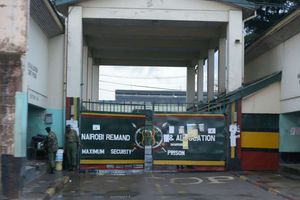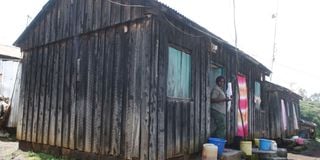
Some of the prison wardens' houses at Nakuru G.K. Prison on July 2, 2018.
The latest audit by Auditor General Nancy Gathungu has revealed how Kenya Prison Service (KPS) officers continue to live in squalid conditions with their families as the government turns a blind eye.
The performance audit report on the provision of housing for prison officers in Kenya, tabled in Parliament, sampled 17 stations across the country. According to the audit, the KPS has 3,894 permanent housing units for a staff of 23,831.
In all the stations visited, life is unbearable as the audit quotes the Officers In Charge (OIC) as saying that the indecent housing has not only affected the officers' work performance but also their social life, as confirmed by the analysis of survey data.
The audit shows that senior officers are allocated houses suitable for junior cadres, while junior officers are accommodated in temporary shacks, including dilapidated A-frame and uni huts, mud houses, iron sheet houses and wooden houses.
Newly recruited officers are housed in open halls and storerooms that are partitioned with cardboard, newspapers, bed sheets or polythene. The houses, the audit found, lacked basic amenities such as water and sanitation.
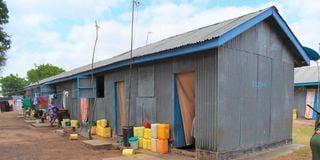
Some of the houses for police officers at the Shimo La Tewa Maximum Prison on February 7, 2023.
"The officers who reported that their houses were in poor condition also reported that their family life was affected, they felt embarrassed to entertain visitors and they lacked privacy in the house, among other things," the audit report said.
This is despite the fact that Article 43 (1) (b) of the Constitution states that every Kenyan citizen, including prison officers, has the right to accessible and adequate housing.
The KPS Service Charter lists adequate housing as one of the rights of prison officers.
"In this regard, houses used for the accommodation of prison officers should be in good living conditions," the audit says.
The 17 stations sampled include Kakamega GK Prison, Kilifi GK Prison, Shimo la Tewa Women Prison, Ruiru Farm Prison, Murang'a GK Prison, Kaloleni GK Prison, Nairobi Remand and Shimo la Tewa Borstal.
The others are Eldoret GK Prison, Shimo la Tewa Maximum Prison, Nairobi West, Nyeri GK Prison, Shimo la Tewa Medium Prison, Kamiti Main, Naivasha GK Prison, Lang'ata Women and Kisumu Command.
The audit shows that most of the houses in these stations are dilapidated and generally have broken windows and doors, damaged and faded walls, run-down facilities and rusty, leaking roofs.
"Instances of aged and dilapidated mud houses being used to accommodate staff were observed at Eldoret, Kakamega, Shimo La Tewa and Kilifi stations among others," the audit says.
Although the KPS Service Charter does not define what a decent house should look like, "it was generally agreed after discussions with KPS management" that a decent house would be a self-contained single room ('bed-sitter 11') with basic amenities - water, electricity and sanitation - for junior officers without family.
A decent house would include a self-contained one-bedroom house with basic amenities for junior officers with family and a self-contained two-bedroom house with basic amenities for senior officers with or without family.
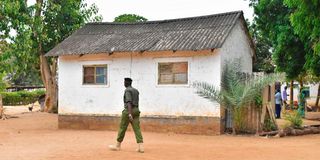
A prison officer walks past a house at Shimo la Tewa Medium Prison, Mombasa County, on February 7, 2023.
The initial phase of the prison reforms introduced in 2003 saw the construction of two and three-bedroom self-contained houses, commonly known as Moody Awori houses.
This was followed by the Rapid Results Initiative (RRI), which has since gobbled up Sh1.6 billion.
Under the RRI plan, OICs were given money and encouraged to use locally available labour and materials to construct staff houses.
But with little funding, the OICs were forced to build makeshift and temporary structures.
The Prisons Act requires the KPS to ensure that all its uniformed staff are housed within the boundaries of the stations in accordance with the Prisons Rules.
While the inadequate accommodation units in the prison lines would have given officers an alternative elsewhere, the law does not allow this, meaning that officers have no option but to find accommodation within the prison lines.
The audit notes that of the 384 officers interviewed who described how prison accommodation had affected their performance, 139, about 36 per cent, said they had low morale.
A further 89, around 23 per cent, and 50, or 13 per cent, said that their work performance was generally affected and that they were under constant stress.
About 138 officers who participated in the survey reported that they do not live with their families in the prison.
"The main reason for separation from the family was the lack of adequate accommodation.
This was reported by 62 per cent of the 138 officers surveyed. Inadequate accommodation also costs the government rental income.
Senior officers are expected to be accommodated in houses that attract a monthly rent at market rates, as they receive a monthly housing allowance.
However, the audit revealed that most senior officers are accommodated in houses that do not attract rent.
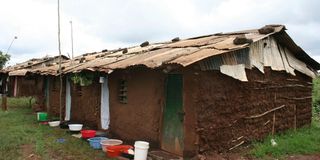
Some of the houses where warders at Kamiti Maximum Prison live.
Data shows that in the 2012/13 financial year, KPS paid Sh129 million as house allowance to prison officers but only received Sh17.8 million as rent.
By the end of 2016/2017, the house allowance paid by KPS to staff had increased to Sh192 million, while receipts in the form of house allowance - the market rate - had "stagnated" at Sh18 million.
Cases of officers being housed in single rooms with their families while other officers shared rooms compromised their privacy, according to the audit.
For example, there were cases where two-bedroom houses were shared by four families each, while one-bedroom houses were shared by two families.
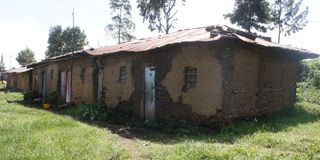
Some of the prison wardens' houses at Nakuru G.K. Prison on July 2, 2018.
The audit also revealed that 150, or about 33 per cent, of the 450 officers interviewed were found to be sharing houses.
Shimo la Tewa Main and Kilifi stations recorded the highest percentage of officers sharing houses at 75 per cent and 71 per cent respectively, while Kaloleni and Murang'a stations had the lowest percentage at 6 percent and 14 per cent respectively.
In addition, 76, or about 51 per cent, of the 150 officers who shared houses had families.
This was more prevalent in the Coast and Rift Valley regions where 28 per cent of officers had their families living with them in shared houses.
Furthermore, up to 57 per cent of officers living with family in shared accommodation were either in single rooms or in bed-sitters.
The living conditions of prison officers are worsened by the fact that their houses lack basic amenities, especially water and sanitation facilities.
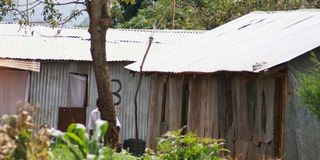
Warders' houses at Lang'ata Women's Prison in Nairobi.
"The non-availability of basic amenities can be attributed to the lack of emphasis on basic amenities as an important component of housing," the audit said.
Officers living in temporary structures were forced to use communal water points located "about" 500 metres from the house.
In most of the flats, such as those at Kamiti Main, Lang'ata Women, Kisumu Main and Ruiru stations, the audit found that although the houses were equipped with running water, most of the taps were dry at the time of the audit.
Of the houses that lacked sanitation facilities, the officers shared the available toilets and bathrooms while others constructed temporary sanitation facilities.
The audit also observed dilapidated sanitation facilities used by officers in Shimo la Tewa and Kisumu Main prisons.
At least 261, about 59 percent of the officers interviewed indicated that they did not have sanitation facilities in their houses.
The most common alternative sanitation methods were therefore communal and own-built temporary sanitation facilities.
The audit however blames the lack of enough decent houses to the shift in policy.
Instances of houses being abandoned as new policies replace previous ones have been revealed. In 2015, the Ministry of Lands Housing and Urban Development indicated that 230 units, both RRI and Moody Awori, were abandoned before completion “mainly due to a shift in policy.”
For instance in Eldoret GK prison, the audit observed that 30 units of Moody Awori houses, started in 2006, had stalled.
The introduction of the RRI programme in 2007/08 did not help as the houses constructed were single rooms and bed-sitters.
Interviews with prison officers, according to the audit, revealed that single rooms and bed-sitters cannot be considered as decent housing “hence, the RRI was not effective in addressing the housing problem.”
dmwere@ke.nationmedia.com

